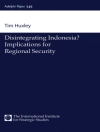‘My worst day as governor was better than my best day as a United States senator.’
—Former Governor Tim Carper (D-DE, 1993–2001)
Governors—both in, and now out of, office—see the job as the best in politics. Why is that? Drawing on a survey of former governors, personal interviews, as well as gubernatorial memoirs and biographies, Rosenthal shows students how and why governors succeed as policy leaders and makes a case as to why some governors are better at leveraging the institutional advantages of the office.
Jadual kandungan
The Job of Governor
What’s So Good About the Job?
What They Want to Achieve
As Governors See It
Policymaking Success
Exploring How and Why Governors Succeed
Playing the Hands They Are Dealt
Gubernatorial Powers
Legislative Power
Party Control and Partisan Division
The Structure of State Government
Economic and Fiscal Conditions
Other Conditions and Events
What Governors Bring to the Table
Personalities
Experience
Friends
Staff
Orientations
Pragmatism
Adaptability
How Governors Put Together Their Policy Agendas
What Is the Governor’s Agenda
Initiatives on the Agenda
The Multiple Sources of Initiatives
How Agendas Are Developed
The Political Calculus at Work
Agendas in a State of Play
Laying the Groundwork for Their Initiatives
Gubernatorial Involvement
Relating to Members
Dealing With Legislative Leaders
Building Relationships With Leaders
Imperfect Together
Strategies and Tactics of Engagement
The Types of Issues in Play
Building Support and Exerting Pressure on the Legislature
Building Support and Exerting Pressure in the Legislature
Tools of Engagement
Playing Defense
Succeeding as Policy Leaders
How Successful Are They
What Makes Them Successful
Having the Upper Hand
Playing the Cards They Are Dealt
Having the Right Stuff
Asking For What They Have a Chance of Getting
Laying the Groundwork
Waging Budget and Policy Campaigns
Legacy and Beyond
How They See Their Legacies
How They Are Remembered
What Difference They Made
Will a New Generation of Governors Be Different?
Appendix A: Governors, 1980–2010
Mengenai Pengarang
Alan Rosenthal is Professor of Public Policy and Political Science at the Eagleton Institute of Politics, Rutgers University. He has collaborated in activities with the National Conference of State Legislatures (NCSL), the Council of State Governments (CSG), and the State Legislative Leaders Foundation (SLLF) and worked on projects and studies for legislatures in about 35 states. Currently, he is working with NCSL, the American Political Science Association (APSA), and the Center for Civic Education on the development and communication of a new public perspective on representative democracy.
In New Jersey, he chaired the Ad Hoc Commission on Legislative Ethics and Campaign Finance in 1990, was selected as the independent member and chair of the Redistricting Commission in 1992, and in 1993 received the Governor′s Award for Public Service. In 1995 Rosenthal received APSA′s Charles E. Merriam Award, which honors a person whose published work and career represent a significant contribution to the art of government through the application of social science research.
His recent books include Republic on Trial: The Case for Representative Democracy (Rosenthal et al., 2003) and Heavy Lifting: The Job of the American Legislature (2005).












